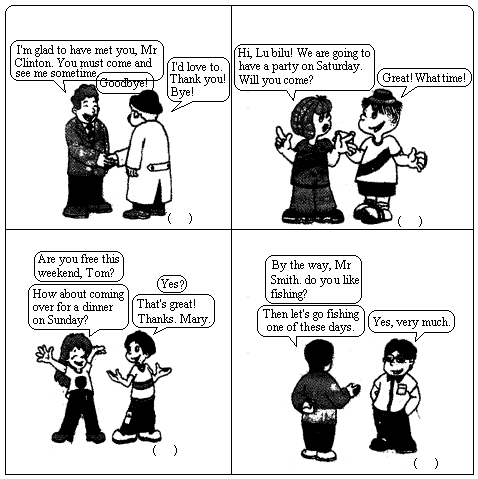
阅读理解.
阅读短文,然后判断图中哪些对话表示邀请(I),哪些仅表示客气(F).
In the United States, people like inviting their friends to their home for a meal, a party, or often just for coffee and conversation. Americans think it friendlier than to take them to a restaurant. Here are what Americans often say when they invite someone to their home.
“Would you like to come for dinner on Friday night?”
“We are going to have a party on Friday night. Would you like to come?”
Replies are “Thanks, I'd love to. What time?” or “I'm sorry. I'd love to, but I'm going to play tennis with John.” By the way, if the invitation is made with “Will you come?” or “Would you like to come?” It is not polite to say “No, I won't.” or “No, I wouldn't.”
Sometimes Americans use some expressions that sound like invitations, but they are not real ones. For example, “Please come over f~ a cup of coffee sometime.”
“Let's go out for a dinner one of these days.” “Why don't you come and see us sometime soon?”
These are usually just polite ways of ending a conversation. They are not real invitations because they don't tell you a specific day or time. These expressions only mean the man is trying to be friendly and the answers to the expressions are “OK, yes, thank you.” or “Yes, that would be great.”
So next time you hear what sounds like an invitation, listen carefully. Is it a real invitation or is the man just being friendly?

科目:初中英语 来源:随堂讲与练 七年级下册(配合牛津英语) 牛津版 题型:050
| |||||||||||||||||||||||||||||||||||||||||||||||||||||||||||||||||||||||||
查看答案和解析>>
科目:初中英语 来源:同步题 题型:阅读理解
查看答案和解析>>
科目:初中英语 来源:同步题 题型:阅读理解
查看答案和解析>>
科目:初中英语 来源:模拟题 题型:阅读理解
查看答案和解析>>
科目:初中英语 来源:同步题 题型:阅读理解
A. an excellent person in Hong Kong
B. a good student
C. an honest friend
查看答案和解析>>
湖北省互联网违法和不良信息举报平台 | 网上有害信息举报专区 | 电信诈骗举报专区 | 涉历史虚无主义有害信息举报专区 | 涉企侵权举报专区
违法和不良信息举报电话:027-86699610 举报邮箱:58377363@163.com